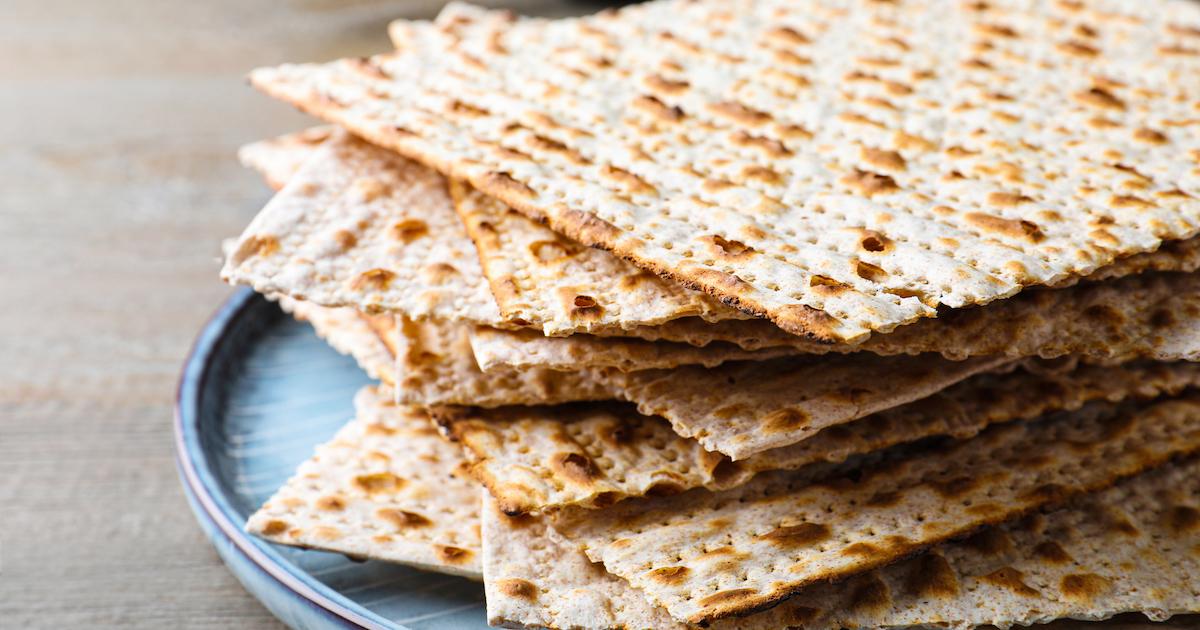5 Tips for Keeping Your Passover Seder Eco-Friendly
Are you up for the challenge of a zero-waste Seder?
Updated April 3 2023, 4:33 p.m. ET

Passover is a holiday that's full of tradition — so why not look to the ways of the past when planning your Passover Seder this year, and keep things eco-friendly? After all, your ancestors definitely did not have paper plates or plastic cups when they were fleeing Egypt. So if you're participating in the holiday this year, read on for five tips to keep your Passover Seder as zero-waste as possible.
When is Passover 2023?
In 2023, Passover begins in the evening of Wednesday, April 5, and concludes in the evening of Thursday, April 13. During the first two nights of the eight-day holiday, Jewish people traditionally sit down to a Passover Seder, which are festive meals in celebration of the holiday.

For a quick refresher (it has been a year since the past Passover, after all), Passover is a holiday celebrating the ancient Israelites' liberation from slavery in ancient Egypt. When the Pharoah freed the Israelites, the Torah says that they fled so quickly that they did not have time for their dough to rise and turn into bread. To honor that, many people observing Passover choose to abstain from eating chametz, which includes leavened wheat, barley, spelt, rye, and oats, according to My Jewish Learning. A lot of Ashkenazi Jews also choose not to eat kitniyot, which encompasses rice, millet, and legumes.
So even though your menu will have to be a bit more limited than usual, there are still so many ways to make the meal delicious, enjoyable, and eco-friendly. Here are our tips for keeping everything at the Passover Seder low-impact.
Don't waste your chametz.
If you plan to keep 100 percent kosher for Passover, you're probably planning to kasher, or "turn over," your kitchen, which means completely ridding it of chametz. The process entails removing every grain of food that may contain chametz — and for some, any food that is not labeled kosher for Passover — from your home. For a last-minute person, this process could result in a lot of waste, because they may resort to throwing away all their food before going Passover shopping. But if you give yourself at least a few days in advance, there are a few more responsible ways to responsibly rid your kitchen of chametz. For example:
- In the weeks and days leading up to Passover, don't buy any new food, and challenge yourself to make dishes out of the chametz you already have.
- Give food away to friends who aren't observing the holiday.
- Donate any sealed food to homeless shelters.
- Sell your chametz online, via the organization Chabad's website.
- If you're less religious, and not concerned about keeping chametz in the house, some Jews opt to lock up one cabinet full of all their chametz during Passover, and then they open it back up after the holiday.
Use reusable kitchenwares.
As explained by Chabad, many religious Jews take kashering very seriously, completely sterilizing their kitchen appliances, furniture, sink, and their dishes, glasses, and cutlery before Passover begins. While some families opt to ease the kitchen preparation process by using disposable kitchenwares throughout Passover, you can keep your holiday eco-friendly by taking the extra time to turn over your plates, cups, and utensils, instead of buying disposable versions for the entire week. Check out Chabad's guidelines on koshering kitchenwares for the holiday.
3. Focus on fresh produce.
Again, those keeping completely kosher for Passover will only eat packaged food that's certified kosher for Passover on the package — with one exception: produce. That's right — loose fruits and veggies are the only foods that can be eaten without being blessed by a rabbi for the holiday. So, to reduce your consumption of food packaging during the holiday, center your meals around fresh fruits and vegetables. Even better, buy them locally at the farmers market, if you have access to one.
4. Serve more plant-based dishes.
Observant Jews traditionally do not mix meat and dairy at meals — but you can make your Seder even more eco-friendly by eliminating both, and hosting a pareve or vegan Passover Seder. Plant-based meals have a much lower environmental impact than meals made with animal products, so consider incorporating a few vegan dishes into your Seder.
Check out the above YouTube video by actress Mayim Bialik, who is both vegan and Jewish, for two of her tastiest vegan and kosher for Passover recipes. You can also check out for VegNews' tips on veganizing your Seder plate, and read about why Passover is such a vegan-friendly holiday, according to the organization Jewish Veg.
Have Tupperware at the ready.
If you don't want guests rifling through your drawers in search of plastic baggies, cling wrap, and tin foil to wrap leftovers, have reusables ready to go. For leftovers you're keeping at home, consider covering dishes with reusable wax wraps or packing food away in containers.
And if you're planning to send your guests home with leftovers (which will not only make you seem like a kind host, but also ensure no food gets wasted) have upcycled Tupperware at the ready. All those Chinese food containers you've been saving since Christmas will finally get a second life! Just make sure you include those containers in your kashering process, if you're doing one. Chag sameach!
This article, originally published in April 2019, has been updated to include updated info on Passover 2023.